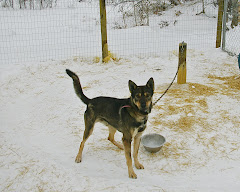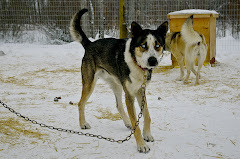Canadian Challenge a successful event
Mushers, dog teams, organizers, vets, volunteers – the team that makes the Canadian Challenge work.
Mushers and dogs glided into La Ronge to complete the 2010 Canadian Challenge. Ten teams started the race with two teams dropping out before the finish line; three eight-dog and fi ve 12-dog teams competed in the 13th Annual Canadian Challenge Sled Dog Race.
Gerry Walker of Pierceland, Sask. took the cup in the 12-dog race; Luke Naber, of Shellbrook fi nished first in the eightdog race.
Sid Robinson, of La Ronge, collected the Red Lantern award for the 12- dog race and Irvin Wai, of Bezanson, Alta. received the Red Lantern for the eight-dog race.
Wai, who competed in the Challenge four times the past, but didn’t finish the race, swept into La Ronge in the surprise finish of the race.
This reporter sat in the bus at the La Ronge checkpoint listening to concern about this musher, who seemed to be lost.
Every few minutes we heard a woman’s voice on the radio expressing concern about this musher who hadn’t come to their checkpoint at the Creighton crossover. The decision was to give him a little longer.
The radio quieted for a bit and someone in the bus saw, what they thought was a snowmobile coming up the dog sled trail and just as everyone was getting concerned, she noticed the dogs in front of the snowmobile, which, of course, turned out to be the sleigh and our “missing” musher joyfully entered La Ronge.
The fun didn’t end there because when the women on the radio was informed of the arrival, we heard her express her confusion on hearing the news about a musher arriving in La Ronge from a phone call with an Alberta number. It turned out the cell phone used to make the call was a local caller, who has an Alberta cell phone number.
With all the confusion cleared up, and the musher identified as indeed No. 51. There was much celebration in Irvin Wai’s successful completion of the race and perhaps the story illustrates some of the care and camaraderie of the people who compete, support, organize and volunteer to do the many tasks, which make this event happen successfully year after year.
One group that is an integral part of the Challenge is the team of veterinarians who give up their time to support the race.
“We’re there as a preventative measure and for emergency care,” said Dr. Ruth Sims, the head vet on the team.
The veterinary team travel up and down the trails throughout the event.
“We try to be at every checkpoint where there’s dog teams,” Sims said.
“We do mandatory vet checks before the race and one at the last checkpoint before the finish line,” she said, adding hydration and lameness are the two areas they look for particularly in the check up.
“They are the two big ones, because they are the main reasons why a dog is going to get sick and not complete the race.”
The advice of a vet is needed if a musher wants to drop a dog from the team during the race.
“If people want to drop a dog out, we check them out and put a red stripe on their head and write it in the race book so they can’t be put back in (the race.)”
And why does she keep coming back? “I think after five years you get to know the mushers, you know the volunteers involved so it’s like coming back and seeing old friends again.
Sims operates a mixed practice in Grand Forks, B.C. where she treats large and small animals, “horses and cattle, cats and dogs, anything that comes through the door basically,” she said.
Sims is a veteran at the Canadian Challenge as this is her sixth year; her third as the head vet. Sims also worked with the Yukon Quest in 2006.
Dr. Stewart Walker, a veterinarian from Shellbrook, assisted on the team for the fi rst year.
The team also included four, fourth-year veterinarian students from the University of Saskatchewan: Glenna McGregor, Andrew Ritson-Bennett, Angela Chen and Maria Sung along with a veterinary technician.
The race began in Prince Albert at noon on Wed. Feb. 10 and ended with an awards breakfast Sun. Feb. 14 at the La Ronge Hotel and Suites.
The highlight of the breakfast - the stories of race experiences, some poignant, some brought gales of laughter from the audience, but they made up the When Jess Allen decided she needed to get on ahead of Sid Robinson, on the race trail so she wouldn’t get the red lantern, she said, “I like to think of Sid as a friend, so you don’t interfere with a friend’s collection.” Robinson traditionally takes home a Red Lantern award, but also exhibits the traditional friendliness and helpfulness characteristic of the early trappers, who used dog teams for their transportation needs and followed the trails to move around the country.
“The route you’ve taken north, that’s our highway,” said CBC’s Tom Roberts
Sunday, May 16, 2010
Saturday, May 8, 2010
Running Free
Now that summers is close to being hot the team looks forward to thier play time,smelling smells having fun chewing and antlers and digging holes ,we have a few that need new homes where they can continue to give plenty of affection and go around Running free ..........................
Subscribe to:
Comments (Atom)













